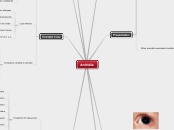作者:Nikki Brodbeck 11 年以前
1032
Aniridia

Aniridia
Treatment
Treatment for strabismus
Botox
Prisms
Surgery
Vision therapy
Treatment for photophobia/nystagmus
Tinted IOLs (intraocular lenses)
Tinted glasses
Tinted/iris contacts
Treatment for poor visual acuity
Low vision aids
Contacts
Glasses
Cataract surgery
Treatment for glaucoma
Cyclocryotherapy
Laser therapy
Goniotomy
Trabeculectomy
Prostaglandin analogues
Carbonic anhydrase inhibitors
Sympathomimetics
Beta-blockers
Miotics
Example Case
Symptoms related to aniridia
Microopthalmus
Strabismus (Esotropia)
Case History
2nd degree burn on face from iron at 1 y.o.
Mother has glaucoma and vision issues
Has twin sister
Born via C-section 1 month prematurely
Healthy, no meds., no allergies
Basic Info
MRN: 91036918
6 y.o. black female
Research
Recurrent progressive anterior
segment fibrosis syndrome following
a descemet‑stripping endothelial
keratoplasty in an infant with
congenital aniridia
Postnatal manipulation of Pax6 dosage
reverses congenital tissue malformation defects
Differential Diagnoses
Gillespie syndrome
Congenital nystagmus
Juvenile gluacoma
Congenital cataracts
Renal ultrasounds to detect tumors and anomalies of the kidneys indicative of WAGR syndrome
Fluorescent in situ hybridization (FISH) used to detect deletions in Wilm tumor genes
Genetic testing for deletions/mutations in chromosomes and genes specific to the condition
Causes
Mutations of AN1 and AN2 genes
Chromosomal deletion of p13 on chromosome 11
Mutation in PAX6 gene
Photos
Presentation
Other possible associated conditions
Gillespie Syndrome
WAGR syndrome
Mental retardation
Genitourinary anomolies
Wilms tumor
Microcornea
Arcus juvenilis
Spontaneous lens dislocation
Ectopia lentis
Keratoconus
Albinism
Strabismus
Optic nerve hypoplasia
Nystagmus
Foveal hypoplasia
Glaucoma
Cataracts
Photophobia
Reduced visual acuity (20/200 or less)
Abnormal pupils
Complete or partial absence of the iris
Epidemiology
Equal in males and females
Diagnosis typically made at infant stage
Easier to diagnose at early stages in Caucasians
Cataracts may develop before 13 years of age
Glaucoma diagnosed between ages 11-20
No racial predisposition exists
1 in 60,000 people have this condition in the US

